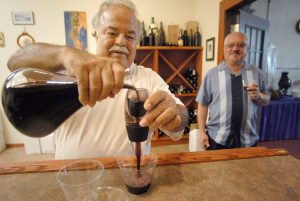Hispanic-run winery at the service of the community
By David Maung

Sandwiched between an auto mechanic’s shop, several modest one-story homes and right across the street from the Navy shipyard, Juan Diaz has been operating his construction materials testing business in San Diego’s Barrio Logan for the past 20 years.
In the courtyard area are neatly arranged concrete cylinders and equipment. There are several rooms that house industrial laboratories fitted with compression machines, X-ray units and stress testers that check metals, concrete and other materials used in construction.
On a Friday afternoon you might imagine finding workers together with cans of Budweiser beer in hand, talking about the upcoming soccer game, making arrangements for a carne asada or unwinding after a week of work.
Not the usual place one might find a winery. But, that’s just the way Juan Diaz likes it.
In the back of the shop sits the Barrio Logan Winery, and today Diaz is drawing a few samples to taste from the eight barrels of Tempranillo, Sangiovese and Nebbiolo grapes brought from Mexico’s Valle de Guadalupe and now in their ninth month of fermentation.
After pouring generous samples of this year’s rather robust and heavy Tempranillo into half a dozen plastic cups, Diaz and some friends gauge the aroma, color and taste.
Thumbs go up.
“I’m simple,” said Diaz. “If it tastes good to me and my friends then it’s good, that’s the key. These barrels are like friends and I like to share with my friends.”
Diaz is a jovial man. A man who finds laughter and joy in just about everything and is at home among his friends.
Inspired by a few of these friends, in 1999 Diaz, discovered the art of wine making. He became enamored with the process and the product and what began as a hobby rapidly developed into a love for the craft.
It also became an opportunity for Diaz to give something back to the community.
Several years ago Diaz was asked to help raise funds for Urban Corps of San Diego County, a non-profit organization that provides career and education opportunities for young adults.
Diaz responded by helping to organize a fund-raiser and provided the wine he makes and the large patio space of his business. The event was a great success and as word spread Diaz soon found himself donating his wine to support various community organizations.
“People like Juan are God-sent people,” said Sam Duran, CEO of Urban Corps. “There’s a special place in heaven for them.”
“He’s very involved with the community but nobody knows it,” said Duran. “He’s a very generous person.”
Last year Diaz produced two barrels of wine, all of which was used. This year he is producing eight barrels, all of which he plans to be use for non-profits.
In addition to helping raise funds for community organizations, the Barrio Logan Winery is also trying to raise appreciation for wines.
Arnold Lovio, an associate of Diaz, points out how cultural identity is growing due to older Chicanos who foster art, culture and identity and because of the growth of young professional Hispanics with money who seek culture and identity. With this has come a growing appreciation for wine.
“Besides the non-profit work, we’re also providing an education about wine,” said Lovio.
“We’re seeing a whole new culture of young Hispanic professionals that want to learn about drinking wine,” said Lovio.
“There are a lot of Hispanic professionals who didn’t drink wine in their families, but now that they are lawyers, doctors, political people, etcetera, they want to learn about wine,” added Lovio. “Here they can ask; they feel at home and comfortable.”
Diaz agrees and sees how this rise of professionals, artists and activists are also seeking to give something back to their community.
“The idea is to always help out with something, to do something,” said Diaz.
“I’m not interested in mass producing or going out and selling (his wine), no, I want it for the neighborhood and the non-profits, because these are the people who give their time for free and how do you compensate that?” said Diaz.
“These are the people I’m working with and it’s a very positive thing. They know the system. We need change? OK, let’s get the Latino in there.”